October is Breast Cancer Awareness Month. Food safety is important for people living with cancer because it is easier for them to become ill.
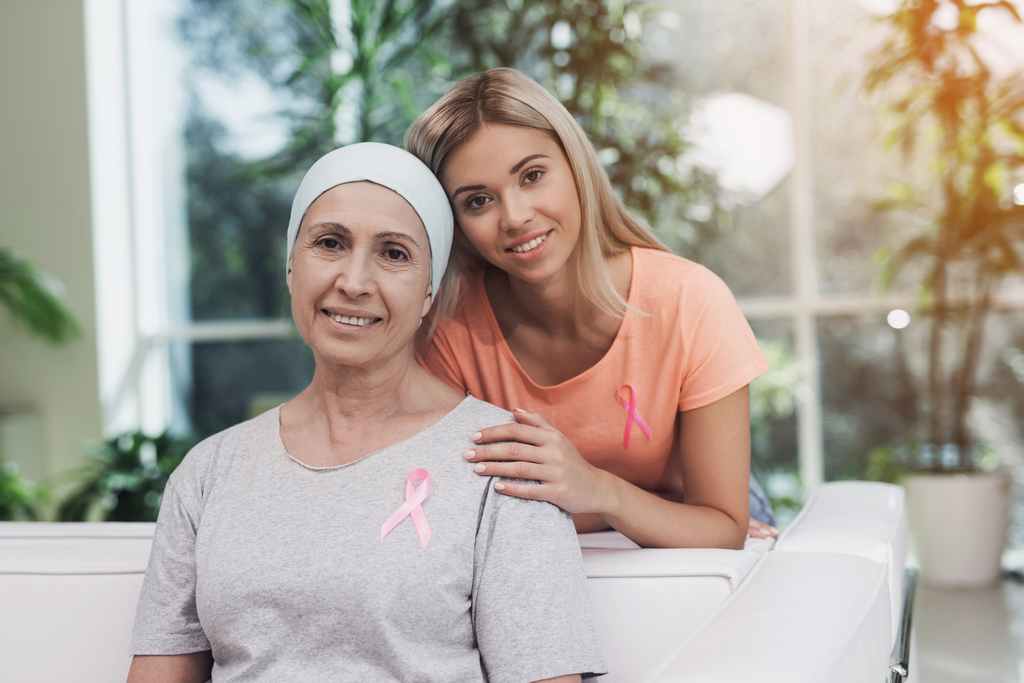


Currently, 8.2 million people die from cancer worldwide every year, out of which, 4 million people die prematurely (aged 30 to 69 years). Breast cancer is the second most common kind of cancer in women. About 1 in 8 women born today in the United States will get breast cancer at some point.
Cancer patients are at a greater risk of suffering from a foodborne illness because of their weakened immune systems. Cancer treatments, such as radiation and chemotherapy, weaken the body’s immune system by affecting the blood cells that protect against disease and germs.
National #BreastCancerAwareness Month is a chance to raise awareness about the importance of early detection of breast cancer – and the risks that come with treatment – like food illness.
- Learn about proper hygiene, cross contamination, cold and hot food safety, foodborne pathogens, and best practices to prevent foodborne illness.
- Food Manager Training & ANSI Certification - $99.00
- Food Handler Training - only $7.00!
- HACCP Training: 16hr/4hr/1hr
- Food Allergy Training - $15.00
- Enter Promo "train10off" at Checkout
Plan a Pink Ribbon Event
The FDA Office of Women’s Health (OWH) has launched the Pink Ribbon Sunday Mammography Awareness Program to educate women about early detection of breast cancer through mammography.
Download the Pink Ribbon Sunday Guide (PDF 1000KB). The guide provides five simple steps and sample materials to help you plan and promote mammography awareness activities in your community.
- Step 1 – Get Support from Church or Organization Leadership
- Step 2 – Start Planning
- Step 3 – Spread the Word: Promote Your Event
- Step 4 – Implement Your Activities
- Step 5 – Do Your Follow-Up
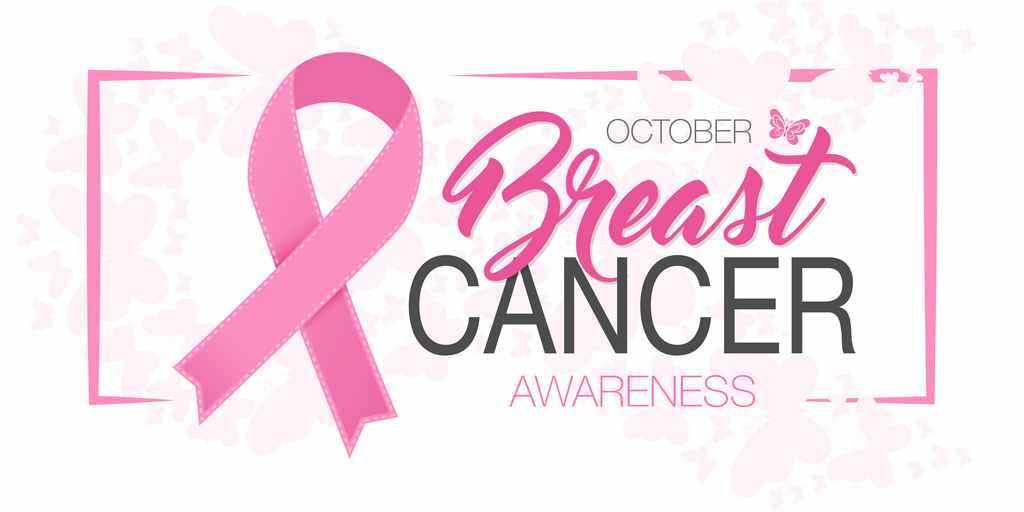


Food Safety During Cancer Treatment
Your cancer and the type of treatment you receive may weaken your immune system. Choosing and preparing safe foods can help protect you from foodborne illness. A diet rich in fruit, vegetables, grains, beans, lean meat, fish and low fat dairy are important to consume to help maintain your strength and immune system. These guidelines can help make sure your foods are safe.
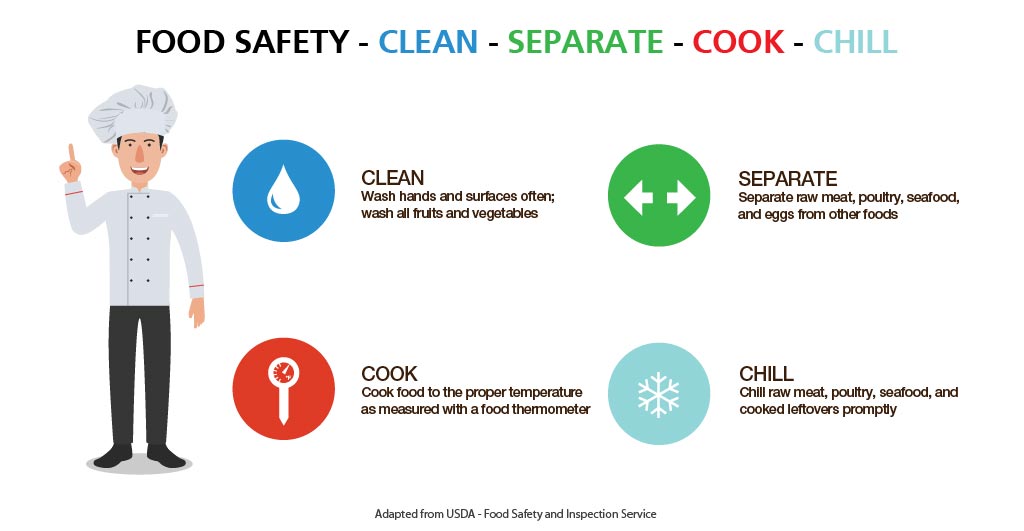


- Wash your hands the right way – for 20 seconds with soap and running water.
- Use a thermometer to make sure your refrigerator is 40°F or lower and your freezer is 0°F or lower.
- Keep raw meat away from fresh produce and other ready-to-eat food, to avoid contamination.
- Thaw or marinate foods in the refrigerator, never on the counter or in the kitchen sink.
- Wash fruits and vegetables (even if you plan to peel them), but do not wash meat, poultry or eggs!
- Use separate cutting boards for raw produce and for raw meat, poultry, seafood, and eggs.
- Use a food thermometer to be sure food is cooked to its proper temperature.
- Refrigerate leftovers within 2 hours in shallow covered containers and use within 3-4 days.
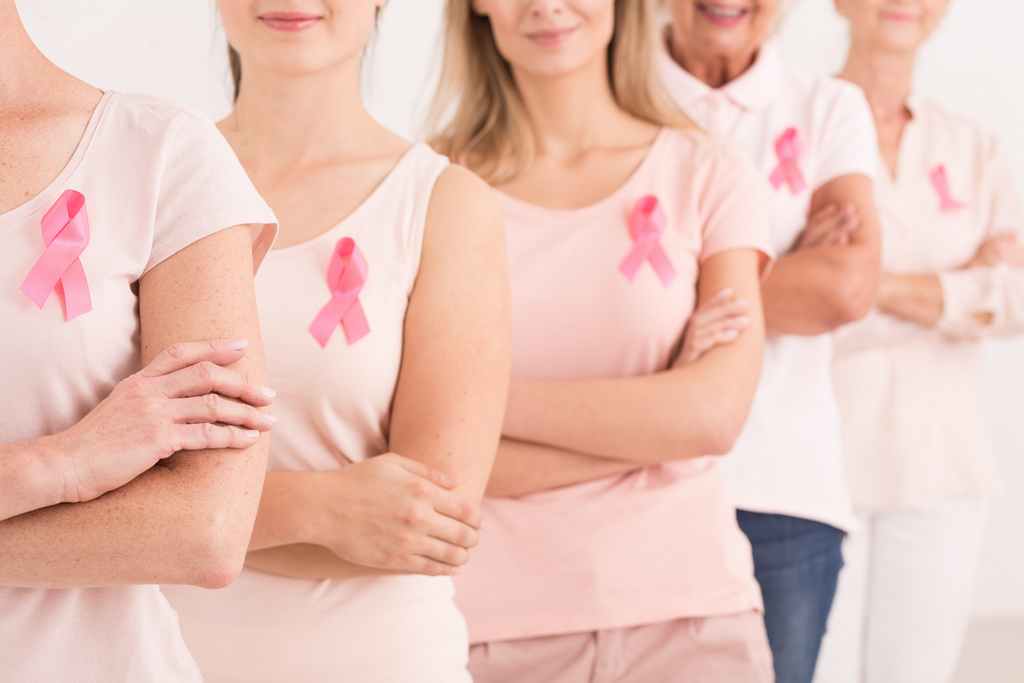


Food Safety for People with Cancer
As a cancer patient, your healthcare provider may have recommended that you take chemotherapy, radiation, or mediations to help fight your disease. A side effect of these therapies is that they may weaken your immune system. Cancer also may weaken your immune system over time due to its chronic disease process.
- A properly functioning immune system works to clear infection and other foreign agents from the body. However, cancer and its treatments can weaken your immune system – making you more susceptible to many types of infections. These infections include those that can be brought on by disease-causing bacteria and other pathogens that cause foodborne illness.
- Because you have cancer and are receiving cancer treatment, you are more likely to have a lengthier illness, undergo hospitalization, or even die, should you contract a foodborne illness.
- To avoid contracting a foodborne illness, you must be vigilant when handling, preparing, and consuming foods.
Make safe handling a lifelong commitment to minimize your risk of foodborne illness. Be aware that as you age, your immunity to infection naturally is weakened.
Infographic: Food Safety for People with Cancer
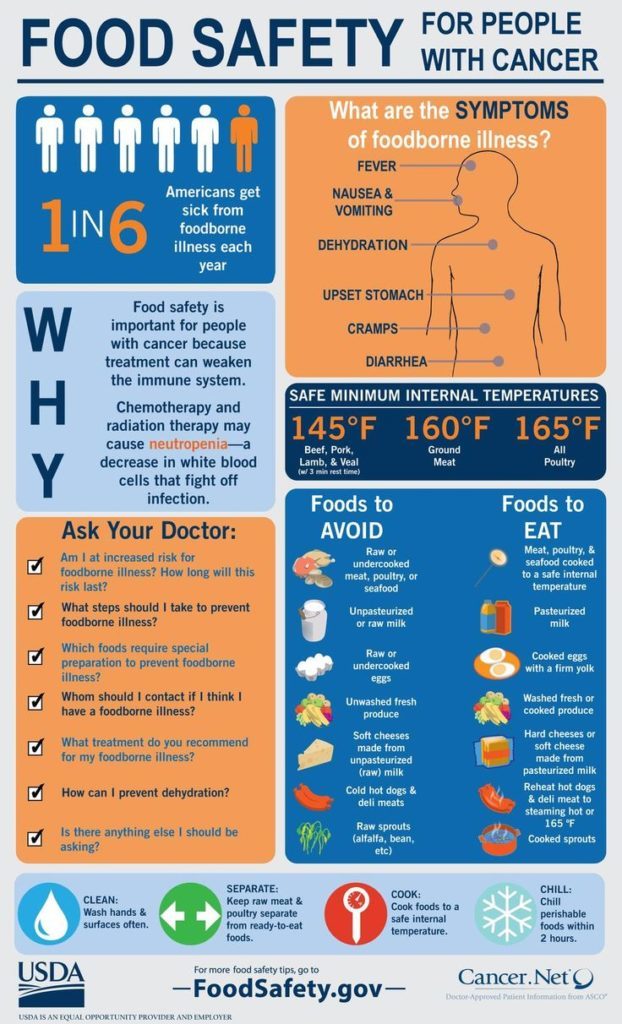


Additional Cancer & Food Safety Resources
- FoodSafety.gov
Gateway to Government Food Safety Information, including all recalls and alerts - Centers for Disease Control and Prevention
1-800-232-4636 (24-hour recorded information) - ASCO’s free 1-page (front and back) fact sheet on Food Safety and Cancer Treatment as a printable PDF.
- National Center for Infectious Diseases/Traveler’s Health
- National Center for Infectious Diseases/Healthy Water
- U.S. Environmental Protection Agency Office of Water
- Partnership for Food Safety Education (Fight BAC )
- Stay Involved with the National Breast Cancer Awareness Foundation
Consider visiting these sites to learn more about breast cancer, breast health, the latest research developments, awareness events and patient resources.
- The American Cancer Society (ACS) is the nationwide community-based voluntary health organization dedicated to eliminating cancer as a major health problem by preventing cancer, saving lives and diminishing suffering from cancer through research, education, advocacy and service.http://www.cancer.org
- The American College of Obstetricians and Gynecologists (ACOG), founded in 1951, is the nation’s leading group of professionals providing healthcare for women. With a membership of over 58,000 physicians, ACOG serves as a strong advocate for quality healthcare for women. It is a private, voluntary and nonprofit organization. http://www.acog.org
- The American College of Radiology (ACR) is a major national medical specialty association comprised of radiologists, radiation oncologists and medical physicists. The College has grown from a group of 20 physicians meeting for the first time in 1923 to a 37,000 member service organization. The core purpose of the ACR is to serve patients in society by empowering members to advance the practice, science and professions of radiological care. http://www.acr.org
- The American Medical Women’s Association (AMWA) is an organization that functions at the local, national, and international level to advance women in medicine and improve women’s health. We achieve this by providing and developing leadership, advocacy, education, expertise and mentoring and through building strategic alliances. Founded in 1915, AMWA is the oldest multi-specialty organization of women physicians. As the vision and voice of women in medicine for nearly a century, AMWA empowers women to lead in improving health for all, within a model that reflects the unique perspective of women. http://www.amwa-doc.org
- The AstraZeneca HealthCare Foundation, established in 1993, is a Delaware nonprofit nonstock corporation and a 501(c)(3) entity organized for charitable purposes, including to promote public awareness of healthcare issues, to promote public education of medical knowledge and to support or contribute to charitable and qualified exempt organizations consistent with its charitable purpose. Since its inception, the Foundation has provided support to the National Breast Cancer Awareness Month organization.http://www.astrazeneca-us.com/foundation/
- CancerCare (founded in 1944) is the leading national organization providing free, professional support services and information to help people manage the emotional, practical and financial challenges of cancer. Our comprehensive services include counseling and support groups over the phone, online and in-person, educational workshops, publications and financial and co-payment assistance. All CancerCare services are provided by oncology social workers and world-leading cancer experts. CancerCare programs and services help 180,000 people each year. We distribute 540,000 publications and welcome 2.3 million website visits annually. In the past year, CancerCare provided more than $14.2 million in financial assistance. The size and scope of CancerCare has grown tremendously since 1944, but it has never wavered from its mission of providing help and hope to people affected by cancer. To learn more, visit www.cancercare.org or call 800-813-HOPE (4673).
- The Conquer Cancer Foundation (CCF) was created by the world’s foremost cancer doctors of the American Society of Clinical Oncology (ASCO) to seek dramatic advances in the prevention, treatment, and cures of all types of cancer. Toward the vision of a world free from the fear of cancer, CCF works to conquer this disease by funding breakthrough cancer research and sharing cutting-edge knowledge with patients and physicians worldwide and by improving the quality of care and access to care, enhancing the lives of all who are touched by cancer. For more information, visit http://www.conquer.org
- Men Against Breast Cancer (MABC), founded in 1999, is the first national nonprofit whose primary mission is to provide national support services to educate and empower men to be effective caregivers, help men cope with the impact of a loved one’s breast cancer diagnosis and treatment and target and mobilize men to be active participants in the fight to eradicate breast cancer as a life-threatening disease. Additionally, MABC offers various services such as the workshop “Partners in Survival” and the “For The Women We Love, A Breast Cancer Action Plan and Caregiver’s Guide For Men.” Also, learn about MABC’s Annual Caregiver’s Conference For Men. For more information on the services provided, please access the website.http://www.menagainstbreastcancer.org
- National Medical Association (NMA), established in 1895, is the largest and oldest professional, educational and scientific organization representing the interests of African American physicians and their patients. Through its membership, professional development, community health education, advocacy, research and collaborative efforts with federal and private agencies and entities, the NMA is committed to improving the health status and outcomes of minorities and the underserved. http://www.nmanet.org
- The Oncology Nursing Society (ONS) is a professional organization of more than 39,000 members committed to promoting excellence in oncology nursing and the transformation of cancer care. Since 1975, ONS has provided a professional community for oncology nurses, developed evidence-based education programs and treatment information, and advocated for patient care, all in an effort to improve quality of life and outcomes for patients with cancer and their families. Together, ONS and the cancer community seek to reduce the risks, incidence, and burden of cancer by encouraging healthy lifestyles, promoting early detection, and improving the management of cancer symptoms and side effects throughout the disease trajectory. ONS actively supports health policy initiatives that support improving cancer symptom management and palliative care, advancing and ensuring access to quality cancer prevention and care, and strengthening nursing workforce contributions to safeguard public health. http://www.ons.org
- Prevent Cancer Foundation is a national nonprofit health organization whose mission is saving lives across all populations through cancer prevention and early detection. Founded by Carolyn Aldigé in 1985, the organization’s commitment is fueled by the fact that up to 50 percent of cancer cases and deaths are preventable through lifestyle choices and screening, yet more than 560,000 Americans will die of the disease this year. Since its inception, the Foundation has invested nearly $150 million in research, education, outreach and advocacy, to Stop Cancer Before It Starts! http://www.preventcancer.org
- Susan G. Komen for the Cure® is the world’s largest breast cancer organization, funding more breast cancer research than any other nonprofit while providing real-time help to those facing the disease. Since its founding in 1982, Komen has funded more than $889 million in research and provided $1.95 billion in funding to screening, education, treatment and psychosocial support programs serving millions of people in more than 30 countries worldwide. Komen was founded by Nancy G. Brinker, who promised her sister, Susan G. Komen, that she would end the disease that claimed Suzy’s life. http://www.komen.org
- The Centers for Medicare & Medicaid Services (CMS) is a federal agency within the U.S. Department of Health and Human Services. CMS runs the Medicare program, Medicaid program and State Children’s Health Insurance Program (SCHIP)—three national healthcare programs that benefit over 80 million Americans. The mission of the CMS is to assure health security for beneficiaries. http://www.cms.hhs.gov
- The National Cancer Institute (NCI), based in Bethesda, MD, is part of the National Institutes of Health (NIH) in the Department of Health and Human Services (DHHS) and the Federal government’s lead agency for cancer research and education. NCI conducts and supports research, training, health information dissemination and other programs with respect to the cause, diagnosis, prevention and treatment of cancer, rehabilitation from cancer and the continuing care of cancer patients and the families of cancer patients. http://www.cancer.gov






